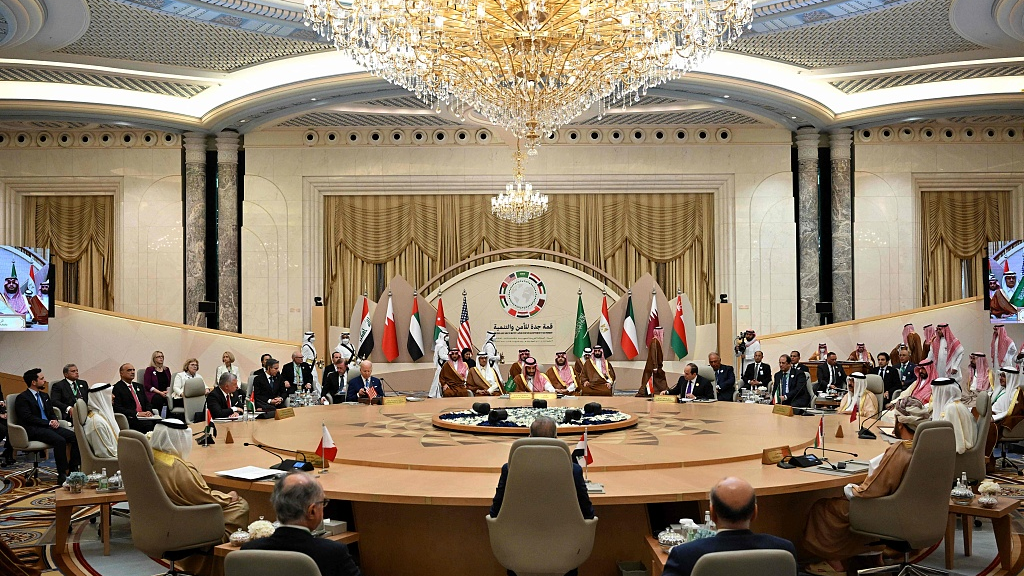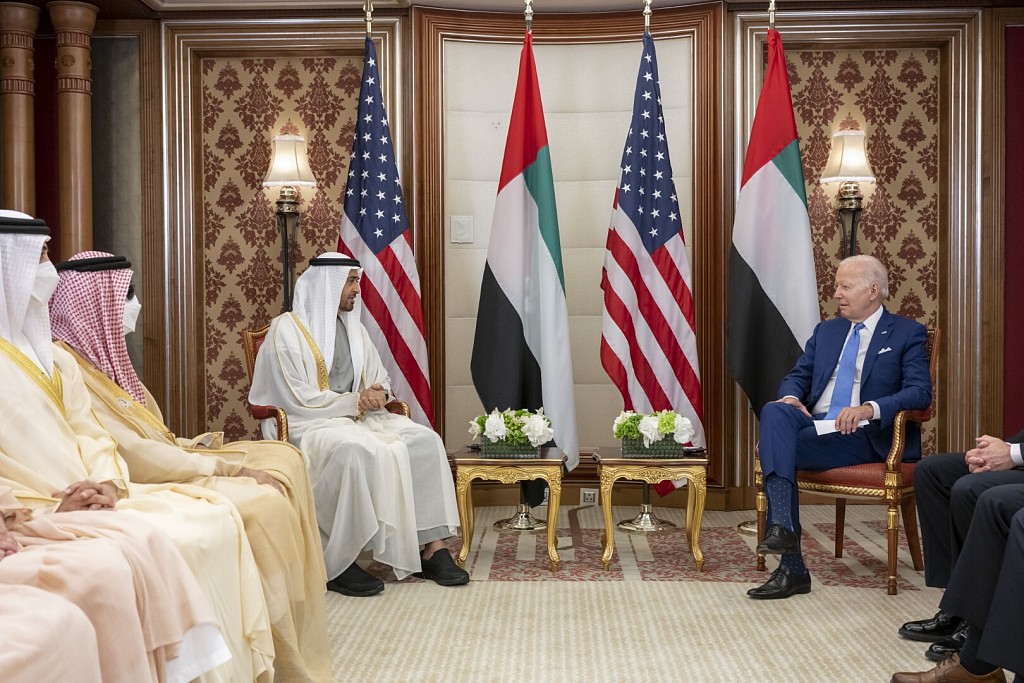
Leaders and representatives of the Gulf Cooperation Council (GCC) countries, the U.S., Egypt, Iraq and Jordan attend the Jeddah Security and Development Summit (GCC+3) at a hotel in Saudi Arabia's Red Sea coastal city of Jeddah, July 16, 2022. /CFP
Leaders and representatives of the Gulf Cooperation Council (GCC) countries, the U.S., Egypt, Iraq and Jordan attend the Jeddah Security and Development Summit (GCC+3) at a hotel in Saudi Arabia's Red Sea coastal city of Jeddah, July 16, 2022. /CFP
Editor's note: Hamzah Rifaat Hussain, a former visiting fellow at the Stimson Center in Washington and former assistant researcher at the Islamabad Policy Research Institute, is a TV anchor at Indus News in Pakistan. The article reflects the author's opinions and not necessarily those of CGTN.
At the Jeddah Security and Development Summit of 2022, U.S. President Joe Biden laid out America's strategy for the Middle East. While Biden promoted principles of American leadership, shared values and common mechanisms for prosperity in the region, the President's Middle East strategy failed to provide solutions to lingering issues in the region while promoting divisions instead.
Beyond commitments to providing economic assistance to GCC+3 states which refers to the six countries of the Gulf Cooperation Council plus Jordan, Iraq and Egypt, the Biden administration also failed to secure major oil and security commitments with no vision for peaceful development or coexistence.
Firstly, while a joint communique was issued by leaders of GCC+3 states, the discourse at the summit was supposed to be geared towards discussing bilateral and regional security solutions for the region. What was witnessed instead was an American attempt to mold sovereign foreign policies of GCC states to adopt Washington's stance on the Ukraine conflict despite an open commitment to neutrality expressed by all member states.
Furthermore, Biden's strategy sought to clarify America's voice to the GCC+3 of wanting to confront Russia and China's growing influence in the region. The narrative from the GCC+3 states as encapsulated in the joint communique however, indicates little appetite for Cold War binaries or provocations promoted by the United States to tackle other countries.
Similarly on visions for peace, the Biden administration spoke about working towards a just, comprehensive and lasting peace environment in the Middle East. However, there was no mention of the two-state solution for the Israeli-Palestinian conflict at the summit or in the joint communique by the United States despite the contours of Biden's Middle East strategy being divisive and controversial.
Note how Qatari Emir Sheikh Tamim Bin Hamad Al Thani spoke about the need to seek a just solution to the Israeli-Palestinian crisis in accordance with international law. Yet America's inability to implement conflict resolution mechanisms, has not stopped Washington's efforts to normalize bilateral relations between Israel and GCC+3 states and by excluding the Palestinian narrative, Biden's strategy will only breed further instability in the region.
Beyond the absence of viable solutions to the Israeli-Palestinian conflict, references were also made to the threat posed by China in the Middle East. President Biden ignored how bilateral and multilateral relations between the GCC and China have remained strong where in 2020, China replaced the European Union as the GCC's largest trading partner with bilateral trade amounting to $161.4 billion.
The region with regional powers such as the United Arab Emirates and Saudi Arabia is also an integral part of the Belt and Road Initiative and not a single GCC member state has hostile ties with China. On the other hand, Washington D.C.'s focus on the Asia Pacific region has been viewed by GCC member states as evidence of American priorities lying elsewhere.

U.S. President Joe Biden (R) meets President of the United Arab Emirates Mohammed bin Zayed Al Nahyan (L) within Jeddah Security and Development Summit in Jeddah, Saudi Arabia, July 16, 2022. /CFP
U.S. President Joe Biden (R) meets President of the United Arab Emirates Mohammed bin Zayed Al Nahyan (L) within Jeddah Security and Development Summit in Jeddah, Saudi Arabia, July 16, 2022. /CFP
It is clear that if the aim of Biden's Middle Eastern strategy is to undercut China's influence in the region, then that is neither practical nor pragmatic given America's own neglect of the region in its recent history.
The Jeddah Security and Development Summit of 2022 did however provide an opportunity for the United States to adopt course correction in the region. Instead, Biden's Middle East strategy became the exact opposite of what White House Official Brett McGurk claimed was a "3D approach" of deterrence, diplomacy and de-escalation.
By issuing threats against Iran for example, the Biden administration will weaken nuclear deterrence in the region and embolden a defiant Iranian leadership to not partake in the Joint Comprehensive Plan of Action negotiations.
Similarly, lack of diplomacy to deescalate tensions between all stakeholders in a region devastated by years of conflict, will result in lingering tensions such as the Israeli-Palestinian quagmire or the Yemen crisis to continue unabated. Finally, without de-escalation or dialogue, tensions between countries in the region cannot be reduced.
Hence, this trip to the Middle East by the U.S. President has once again proved that Washington D.C. has no vision for peace in the Middle East beyond mild assurances. The truth is that controversial strategies will only result in a more divided and polarized region.
(If you want to contribute and have specific expertise, please contact us at opinions@cgtn.com. Follow @thouse_opinions on Twitter to discover the latest commentaries in the CGTN Opinion Section.)

